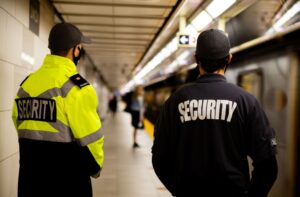One of the most critical aspects of managing large-scale events is the ability to communicate effectively and efficiently to ensure the safety and well-being of all attendees. From pre-event planning to real-time communication during events and post-event debriefs, adopting robust communication strategies is crucial to enhancing event safety and maintaining a positive experience for all spectators.
CR Training is a reliable, accredited, and professional training and consultancy company committed to providing comprehensive education and guidance in event safety, including essential communication strategies for spectator safety. In this article, we will delve into key communication strategies and best practices that will contribute to a safer and more enjoyable event experience. With CR Training as your partner, you can confidently tackle the challenges of event communication and safety, ensuring your organisation’s success in the face of an ever-evolving event landscape.
Developing a Comprehensive Communication Plan
A crucial step towards ensuring spectator safety at events is the development of a comprehensive communication plan. Such a plan should outline communication protocols, objectives, stakeholders, messaging, and channels to be used. When formulating a communication plan, consider the following factors:
- Identifying Key Stakeholders: Clearly identify the parties involved in the event, including event organisers, first responders, medical personnel, security staff, volunteers, and spectators. Establishing communication channels between these stakeholders is essential for effective co-ordination and prompt response to incidents.
- Defining Communication Objectives: Develop clear objectives for your communication plan, such as timely dissemination of safety information, incident reporting, and emergency response coordination.
- Establishing Communication Channels: Choose appropriate communication channels for relaying information, such as radio systems, mobile applications, public address systems, and social media platforms.
- Developing Messaging: Craft clear and concise messages tailored to each stakeholder group, ensuring relevant information is conveyed effectively.
Training Staff and Volunteers in Communication Protocols
An essential component of successful event communication is ensuring that all staff and volunteers involved in the event are familiar with the established communication protocols. Effective training should cover:
- Communication Roles and Responsibilities: Clearly define and communicate the roles and responsibilities of each team member, ensuring that everyone knows who to contact in specific situations.
- Channel Usage: Train team members on the proper use of communication channels, ensuring they understand when and how to use each tool.
- Emergency Communication Procedures: Outline clear procedures and protocols for communicating during emergencies or unexpected incidents. This may include establishing a designated emergency radio channel or implementing a crisis communication plan.
- Reiteration and Practice: Regularly reiterate communication protocols and conduct drills or simulations to ensure that staff and volunteers are well-equipped to respond to real-life event scenarios.
Real-time Communication during Events
Effective communication is especially crucial during the event, as it enables organisers to respond promptly to emerging safety concerns. Some strategies for enhancing real-time communication at events include:
- Implementing a Centralised Command Centre: Establish a centralised command centre where all key event stakeholders can co-ordinate their efforts, allowing for seamless communication and decision-making.
- Monitoring Social Media: Utilise social media platforms to monitor attendee feedback and concerns, enabling organisers to address potential safety issues proactively.
- Providing Updates and Announcements: Regularly share event updates and safety information with attendees through public address systems, digital displays, and social media channels.
- Emergency Alerts: In the event of an emergency, utilise all available communication channels to alert attendees, staff, and emergency response teams, enabling a swift response and minimising potential harm.
Post-Event Communication and Feedback
After the conclusion of an event, it is essential to conduct a post-event debrief to review the effectiveness of communication strategies, identify areas for improvement, and refine protocols for future events. Key components of the post-event communication assessment should include:
- Debriefing Key Stakeholders: Conduct a comprehensive debrief with all essential event personnel to review communication protocols and strategies, identify challenges, and discuss possible improvements.
- Gathering Attendee Feedback: Obtain feedback from event attendees through surveys or social media to gain valuable insights into their experience and address any communication issues they may have encountered.
- Evaluating Communication Metrics: Assess communication effectiveness by analysing data, such as social media reach and engagement, emergency response times, and incident reports. This information can be used to further refine communication strategies.
- Implementing Lessons Learned: Implement recommended improvements and updates to communication protocols, ensuring that insights gained from the event are carried forward to future events.
Spectator Safety Training in Edinburgh
CR Training’ Spectator Safety Training
As Edinburgh’s vibrant event scene continues to grow, the need for effective communication strategies to ensure spectator safety becomes increasingly important. CR Training offers a range of spectator safety training courses in Edinburgh that cover essential communication strategies, equipping event organisers and staff with the skills and knowledge required to effectively manage spectator safety.
Customised Training Solutions for Edinburgh Events
At CR Training, we understand that each event is unique in its communication challenges and requirements. Our team of expert trainers is committed to delivering tailored training solutions that address the specific needs of your event in Edinburgh. By focusing on the unique communication challenges of your event, we ensure your team is armed with practical knowledge and strategies that will contribute significantly to spectator safety.
Expert Training for Well-Equipped Teams
With a team of experienced and knowledgeable trainers, CR Training provides comprehensive training in essential communication strategies for spectator safety, ensuring that your team is well-versed in best practices and industry standards. Our training covers a wide range of communication aspects, from developing a communication plan to addressing emergency alerts and post-event communication. This holistic approach prepares teams to tackle complex communication challenges effectively, contributing to overall event safety and success.
Strengthen Spectator Safety through Effective Communication with CR Training
Implementing essential communication strategies is critical to ensuring spectator safety at events of all sizes. By developing a comprehensive communication plan, training staff and volunteers in communication protocols, adopting real-time communication practices during events, and conducting post-event assessments, your organisation can significantly enhance event safety and deliver a positive experience to attendees.
CR Training is committed to supporting your organisation in achieving exemplary spectator safety standards in Edinburgh by providing tailored training courses and expert guidance on essential communication strategies. With our experienced trainers and customised training approach, your team will be well-equipped to tackle the communication challenges that lie ahead, ensuring your event’s success and the safety of all attendees. Contact CR Training today to discover how our training solutions can help elevate your event planning and communication competencies to new heights.




